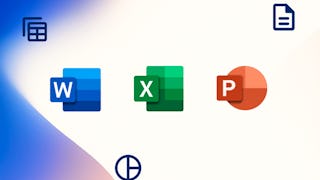Filter by
SubjectRequired
LanguageRequired
The language used throughout the course, in both instruction and assessments.
Learning ProductRequired
LevelRequired
DurationRequired
SkillsRequired
SubtitlesRequired
EducatorRequired
Explore the Microsoft Access Course Catalog

Universitat Autònoma de Barcelona
Skills you'll gain: Microsoft Access, Database Design, Databases, Data Store, Database Management, Microsoft Office, Data Entry, Query Languages, Records Management
 Status: New
Status: NewSkills you'll gain: Microsoft 365, Data Integration, Report Writing, IT Automation
 Status: NewStatus: Free Trial
Status: NewStatus: Free TrialSkills you'll gain: Content Performance Analysis, Multimedia, Microsoft PowerPoint, Microsoft Copilot, Microsoft Excel, Excel Formulas, Microsoft Word, Microsoft Outlook, Microsoft Teams, Presentations, Spreadsheet Software, Microsoft 365, Microsoft Office, Content Creation, Productivity Software, Collaborative Software, Generative AI, Data Analysis, Data Visualization, Business Communication
 Status: Free Trial
Status: Free TrialMicrosoft
Skills you'll gain: Multimedia, Microsoft PowerPoint, Microsoft Excel, Excel Formulas, Microsoft Word, Microsoft 365, Data Visualization, Presentations, Spreadsheet Software, Collaborative Software, Microsoft Office, Productivity Software, Data Import/Export, Microsoft Windows, Editing, Document Management, Technical Documentation, Writing, Computer Literacy, Web Content Accessibility Guidelines
 Status: Free Trial
Status: Free TrialMicrosoft
Skills you'll gain: Excel Macros, Prompt Engineering, Microsoft Excel, Data Cleansing, Excel Formulas, Pivot Tables And Charts, Microsoft Copilot, Dashboard, Forecasting, Data Presentation, Data Storytelling, Data Processing, Data Visualization Software, Data Manipulation, Data Visualization, Workflow Management, Data Wrangling, Data Quality, Statistical Analysis, Data Transformation
 Status: Free Trial
Status: Free TrialMicrosoft
Skills you'll gain: Microsoft Excel, Excel Formulas, Data Visualization, Spreadsheet Software, Microsoft Office, Microsoft 365, Productivity Software, Data Import/Export, Data Management
What brings you to Coursera today?
 Status: Free TrialStatus: AI skills
Status: Free TrialStatus: AI skillsMicrosoft
Skills you'll gain: Power BI, Microsoft Excel, Data Analysis, Data Literacy, Data Visualization, Data Storage, Microsoft Power Platform, Data Collection, Data Quality, Business Analytics, Timelines, Advanced Analytics, Database Design, Statistical Reporting, Statistical Visualization, Business Intelligence, Data Integration, Data Storage Technologies, SQL, Data Manipulation
 Status: Free Trial
Status: Free TrialSkills you'll gain: Excel Formulas, Microsoft Excel, Data Cleansing, Data Analysis, Data Import/Export, Spreadsheet Software, Data Wrangling, Data Quality, Pivot Tables And Charts, Google Sheets, Data Manipulation, Data Science, Data Integrity, Information Privacy
 Status: Free TrialStatus: AI skills
Status: Free TrialStatus: AI skillsMicrosoft
Skills you'll gain: Microsoft Power Platform, Excel Formulas, Process Flow Diagrams, Business Process Modeling, User Story, Business Requirements, Stakeholder Management, Data Modeling, Microsoft Excel, Software Development Life Cycle, Requirements Analysis, Requirements Elicitation, Quality Management, Pivot Tables And Charts, Microsoft Visio, Power BI, Microsoft Power Automate/Flow, Business Analysis, Scrum (Software Development), Data Analysis
 Status: Free Trial
Status: Free TrialSkills you'll gain: Data Import/Export, Programming Principles, Web Scraping, Python Programming, Jupyter, Data Structures, Data Processing, Pandas (Python Package), Data Manipulation, JSON, Computer Programming, Restful API, NumPy, Object Oriented Programming (OOP), Scripting, Application Programming Interface (API), Automation, Data Analysis
 Status: Free Trial
Status: Free TrialMicrosoft
Skills you'll gain: Web Scraping, Data Structures, Git (Version Control System), Generative AI, Version Control, Matplotlib, Plotly, DevOps, Agile Methodology, Web Development, Data Ethics, Flask (Web Framework), Data Visualization, Scripting, GitHub, Debugging, Data Cleansing, Data Analysis, Automation, Cloud Computing
 Status: NewStatus: Free Trial
Status: NewStatus: Free TrialSkills you'll gain: Microsoft Power Platform, Microsoft Power Automate/Flow, Power BI, Dashboard, No-Code Development, Data Visualization, Data Visualization Software, Data Integration, Microsoft 365, Business Intelligence, Business Process Automation, Application Development, Data Analysis, Performance Analysis, Application Design, Data Security, Business Process, Microsoft Teams, Database Management Systems, Data Modeling
Microsoft Access learners also search
In summary, here are 10 of our most popular microsoft access courses
- Competencias digitales de ofimática: Microsoft Access: Universitat Autònoma de Barcelona
- Microsoft Access 2021 - Beginner to Advanced: Packt
- Microsoft 365 Essentials: Create, Collaborate, and Deliver: Microsoft
- Microsoft 365 Fundamentals: Microsoft
- Microsoft Excel: Microsoft
- Work Smarter with Microsoft Excel: Microsoft
- Microsoft Power BI Data Analyst: Microsoft
- Excel Basics for Data Analysis: IBM
- Microsoft Business Analyst: Microsoft
- Python for Data Science, AI & Development: IBM










